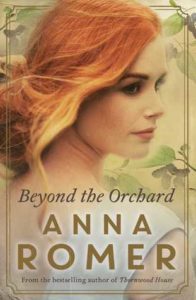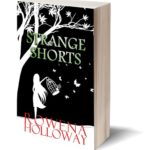Anna Romer’s third novel is another engrossing gothic tale of love and family and the secrets hidden within historical walls.

About the Book
Lucy Briar is a woman trying to move on from her past: from her hopeless love for an unsuitable man and from the disharmony and fractured relationships across three generations of her family. She’s engaged to a wonderful man who loves her and has built herself a promising career in London. But as her nuptials approach Lucy becomes increasingly fractious. And when she returns to Australia she has more to contend with than wrapping up her grandfather’s estate. It’s time for Lucy to stop running and confront her past, a past rooted in the secrets held at Bitterwood.
My thoughts
As with her previous two novels, Romer weaves contemporary and historical family stories, and the cloth she creates for Beyond the Orchard is complex and masterful. The use of the reimagined fairytales, written by Lucy’s father, heighten the mood and suggest insights into Briar family history (and perhaps Lucy herself). Tragedy seems as deeply embedded in this family as the dysfunction that keeps them tethered. The Bitterwood settings are beautifully realized and Romer brings a beautifully gothic note to the once-grand house, the abandoned orchard and the ice house with its secrets beneath the hillock.
I thoroughly enjoyed immersing myself in this novel. Beyond the Orchard is not a pacey read. Lucy’s passions and torments run deep, but she is a very contained character, at times almost passive in her inability to move forward. I did have some difficulty forming a clear picture of the historical timeline for the early part of the novel. No that it mattered. The writing is often lyrical, the story well-constructed, and I was intrigued from the get-go. From the beginning we know that at Bitterwood in 1933 a woman died and Edwin feels responsible. Who died? Why does Edwin feel so responsible? This intrigue kept me reading—and guessing. As the story unfolded across both timelines, these questions deepened and drew me deeper into the story of Bitterwood, shipwreck survivor Orah and the aboriginal servants, Wirra and Nala, who save her.
Beyond the Orchard is metaphorically and thematically rich. Abandonment by mothers, through death or circumstance, is a dominant theme and Romer explores the impact of this absence upon Orah, Lucy and her father Ron. The neglected home, the ruined orchard and the darkness of the icehouse are great metaphors, as is the use of storms to shape significant events. Beyond the Orchard is a novel I could happily re-read with no loss of interest.
About the Author
Read my review of Anna Romer’s Lyrebird Hill
Read my interview with Anna Romer
Time poor but love to read? Grab your FREE copy of Strange Shorts TODAY!
 Ten gripping tales of love and relationships. Includes tasters of each of my novels.
Ten gripping tales of love and relationships. Includes tasters of each of my novels.